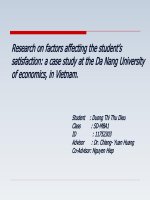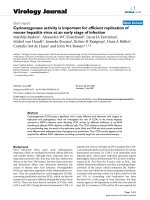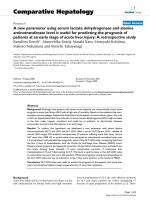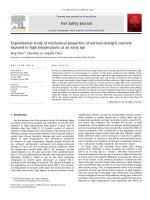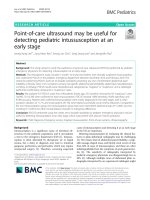Benefits of learning english at an early age of children in vietnam context graduation paper, major english pedagogy
Bạn đang xem bản rút gọn của tài liệu. Xem và tải ngay bản đầy đủ của tài liệu tại đây (3.82 MB, 84 trang )
TABLE OF CONTENTS
ACKNOWLEDGEMENTS
ABSTRACT
CHAPTER ONE: INTRODUCTION ................................................... 1
1.1 Children should start learning foreign languages at an early age ... 2
1.2 Significance of the study ..................................................................... 3
1.3 Research questions ............................................................................. 4
1.4 Scope of the study ............................................................................... 4
1.5 Structure of the Thesis ....................................................................... 4
CHAPTER TWO: LITERATURE REVIEW ........................................ 5
2.1 Background of “golden age period” for children to learn English
effectively ................................................................................................. 6
2.2 Benefits of learning English at an early age ..................................... 8
2.2.1 Cognitive development ............................................................ 8
2.2.2 Academic achievement ......................................................... 10
2.2.3 Better linguistics .................................................................... 11
2.2.4 Career and salary boost ........................................................ 12
2.2.5 Social abilities ........................................................................ 13
2.3 Difficulties in teaching English to children at a very young age ... 14
2.4 Review of English learning programs for Vietnamese children in
English centers........................................................................................ 15
CHAPTER THREE: METHODOLOGY ............................................. 18
3.1 Research approach .......................................................................... 19
3.2 Research setting ................................................................................ 19
3.3 Description of the subjects .............................................................. 22
3.4 Procedures of data collection .......................................................... 23
3.5 Data analysis .................................................................................... 24
CHAPTER FOUR: RESULT ................................................................ 25
CHAPTER FIVE: CONCLUSION, AND RECOMMENDATIONS .. 39
5.1 Purpose of the study ......................................................................... 40
5.2 Review of important findings and discussion on the results ......... 40
5.2.1 The importance for children to learn English at a very young
age ................................................................................................... 40
5.2.2 The “golden age period” for children to learn English
effectively ........................................................................................ 41
5.2.3 Benefits of learning English at an early age ......................... 41
5.2.4 Difficulties in teaching English to children at a very young age
......................................................................................................... 45
5.3 Limitations of the study ................................................................... 46
5.4 Implication ........................................................................................ 47
5.5 Recommendations ............................................................................ 47
REFERENCES ...................................................................................... 54
APPENDIX ............................................................................................. 59
ACKNOWLEDGEMENTS
In the first place, I would like to show my most sincere thanks and deep
gratitude to my graduation research paper advisor, Ms. Diep Minh Chau, who has
contributed greatly in the process of forming this research from day one. From the
beginning, she gave me helpful instructions for identifying the best ways for this
graduation research paper. Moreover, without her encouragement, I could not go
through my crisis period, and this research would have not been finished. In
addition, I would like to appreciate her useful comments and sincere advice.
Therefore I was able to promptly correct the errors which I encountered during the
process.
I also would like to deliver my heartfelt thanks to my beloved friends in
AV1504 and SA1502 classes. They also helped me a lot and gave me useful tips
during the process of this research paper.
Moreover, I am particularly grateful to 30 English teachers of Vietnam USA
Society English System-VUS at Hau Giang Campus, District 6. They
enthusiastically participated in conducting the survey, and also their teaching
experience and objective answers greatly helped me in finding the results of this
study.
Last but not least, I would like to thank my greatly supportive family
members, especially my parents, who always give me strong supports and energy
thus I could continue to carry on my research paper.
ABSTRACT
Nowadays, we live in a globalized world, where everyone communicates
with each other through many languages. People realize the importance of learning
English, especially in Vietnam. The demand for learning English in Vietnam is
currently growing strongly, and parents are now having their children learn English
at a very young age. Furthermore, researchers show that in order to achieve a fluent
of speaking English, children should start learning English from a very young age.
Early learning of English does not only brings certain benefits but also helps them
adapt foreign language better.
Many people know that learning English at an early age brings many
benefits, however, there are some still do not know what the specific benefits of
learning English at a very young age are. Therefore, the writer worked on this
research paper to aim at pointing out the benefits of learning English to children in
the Vietnam context and investigating the “golden age period" for kids to start
learning English, and the result of the study is helpful for English centers in
developing English classes which are suitable for the “golden age period” of young
kids. To carry out this paper, 30 teachers, who have been teaching kids from four to
six years old at Vietnam USA Society English Centers (VUS)-Hau Giang CampusDistrict 6 were selected to take part in the investigation. A 2-sections-questionnaire
was delivered to the teachers to examine the teachers’ perspective about the benefits
of learning English at an early age and the “golden age period” of learning English
for kids. Section A had four closed questions about the teachers’ personal
information. Section B contains nine questions, including six Likert-scale-questions,
two closed questions, and one opened question.
In this research paper, the result was based on both perspective and teaching
experience of the teachers, it indicates that the “golden age period” for young kids
to learn English effectively is from three to six years old. The result of the survey
also pointed out that learning English helps children develop many cognitive skills
such as problem-solving skills, critical thinking skills, creativity, the flexibility of
mind, memory improvement, multitasking abilities. Furthermore, these advantages
such as higher academic achievement, better linguistics, career and salary boost,
and social abilities were found in learning English at an early for children. The
result of the study is helpful for English language centers in developing English
classes which are suitable for the “golden age period” of young kids. Although most
of the VUS teachers recognized the benefits of learning English at an early age, they
admitted that they found it is difficult to teach English for children at a very young
age. This leads to some recommendations were given to teachers with the hope that
they can partly help them overcome the difficulties which are mentioned above.
BẢN TÓM TẮT
Ngày nay, chúng ta sống trong một thế giới tồn cầu hóa, nơi mọi người giao
tiếp với nhau thông qua nhiều ngôn ngữ. Mọi người nhận ra tầm quan trọng của
việc học tiếng Anh, đặc biệt là ở Việt Nam. Nhu cầu học tiếng Anh ở Việt Nam
hiện đang tăng mạnh, và các bậc cha mẹ hiện đang cho con em mình học tiếng Anh
từ khi cịn rất nhỏ. Hơn nữa, các nhà nghiên cứu cho thấy rằng để đạt được khả
năng nói tiếng Anh thành thạo, trẻ em nên bắt đầu học tiếng Anh từ khi còn rất nhỏ.
Học tiếng Anh sớm không những đem lại những lợi ích nhất định cho trẻ mà cịn
giúp chúng tiếp thu ngôn ngữ tốt hơn.
Mọi người đều biết rằng học tiếng Anh từ khi còn nhỏ mang lại nhiều lợi ích,
tuy nhiên, vẫn cịn có một số người vẫn chưa biết những lợi ích cụ thể của việc học
tiếng Anh từ sớm. Do đó, tác giả đã thực hiện bài nghiên cứu này để chỉ ra những
lợi ích của việc học tiếng Anh từ sớm cho trẻ em ở Việt Nam và khảo sát độ tuổi
vàng, thích hợp nhất để trẻ bắt đầu học tiếng Anh, và kết quả của bài nghiên cứu
này rất hữu ích cho các trung tâm tiếng Anh trong việc phát triển các lớp học tiếng
Anh phù hợp với độ tuổi vàng để học tiếng Anh của trẻ nhỏ. Để thực hiện bài
nghiên cứu này, 30 giáo viên, những người đã và đang dạy tiếng Anh cho trẻ em từ
bốn đến sáu tuổi tại Hệ thống Anh văn Hội Việt Mỹ (VUS)-Cơ sở Hậu Giang-Quận
6 đã được chọn để tham gia thực hiện cuộc khảo sát này. Một bảng câu hỏi gồm hai
phần đã được gửi cho các giáo viên để khảo sát quan điểm của giáo viên về lợi ích
của việc học tiếng Anh từ khi cịn nhỏ và độ tuổi vàng thích hợp nhất để trẻ học
tiếng Anh. Phần A gồm bốn câu hỏi về thông tin cá nhân của các giáo viên đã tham
gia làm khảo sát. Phần B gồm chín câu hỏi, trong đó có sáu câu hỏi sử dụng thang
đo xếp hạng Likert năm mức độ, hai câu hỏi đóng và một câu hỏi mở.
Trong tài liệu nghiên cứu này, kết quả dựa trên cả quan điểm và kinh nghiệm
giảng dạy của các giáo viên tiếng Anh tại trung tâm Anh ngữ VUS, kết quả đã chỉ ra
rằng độ tuổi vàng để trẻ em học tiếng Anh hiệu quả là từ ba đến sáu tuổi. Kết quả
của cuộc khảo sát cũng cho thấy việc học tiếng Anh giúp trẻ phát triển nhiều kỹ
năng nhận thức như kỹ năng giải quyết vấn đề, kỹ năng tư duy phê phán, sáng tạo,
linh hoạt, cải thiện trí nhớ , khả năng đa nhiệm. Hơn nữa, những lợi thế như thành
tích học tập cao hơn, ngơn ngữ học tốt hơn, tăng khả năng tìm kiếm cơ hội việc làm
trong tương lai và khả năng xã hội đã được tìm thấy khi học tiếng Anh từ rất sớm ở
trẻ em. Kết quả của bài nghiên cứu rất hữu ích cho các trung tâm tiếng Anh trong
việc phát triển các lớp học tiếng Anh phù hợp với độ tuổi vàng để học tiếng Anh
của trẻ em. Mặc dù hầu hết các giáo viên đều nhận ra lợi ích của việc học tiếng Anh
từ sớm, tuy nhiên họ cũng thừa nhận đã gặp khơng ít khó khăn khi dạy tiếng anh
cho trẻ ở độ tuổi quá nhỏ. Do đó, một vài đề xuất đã được đưa ra cho các giáo viên
với hy vọng rằng các đề xuất này có thể phần nào giúp giáo viên khắc phục được
những khó khăn đã được đề cập bên trên.
1
CHAPTER I: INTRODUCTION
1.1 Children should start learning foreign languages at an early age
Nowadays learning English is absolutely necessary for all ages. Instead of
focusing on studying Maths and Physics as before, parents now let their children
study English when they are at an early age. However, unlike studying Maths and
Physics, the sooner we learn a language, the better it will get. Learning English at
an early age is totally beneficial. At this age, it is easier for them to adapt a new
foreign language, therefore children can absorb English naturally like their first
language. And of course, when children acquire language as their mother tongue, it
can help children pronounce words more exactly and naturally like native speakers.
Moreover, it helps children reduce a lot of time in learning English communication
because adults who want to learn English communication will take a lot of time and
will not be able to communicate fluently like native speakers.
At the stage of six months, infants begin to babble and imitate sounds that
they usually hear. For example, they may try to call their parents and make some
simple sounds such as “baba” and “mama”. Louise and Brenda’s research (2013)
showed that children who are from one to two years put single words to make a
sentence and this is the time when they start to make questions about anything
surroundings them. Furthermore, they are extremely interested in listening to songs
for kids and singing along although they do not even know the meaning of the song.
When children are at this stage of age, they will develop the ability to learn a new
language better than children at other ages.
No one can deny the significance of brain development in early babyhood
education. Nowadays, with technology development and research, we may have an
opportunity to study more about the brain, how it works and the detailed periods for
its development. At the age of two to three, infants seem to have an interest in the
world and begin to make lots of “why” questions about their environment. They
2
also pretend to be animals by imitating their motions and sounds: barking like a
dog, flying like a bird, making sounds like a snake. This is also an important time
for brain development because children want to learn more to express their feelings
and they also desire to communicate with their parents or others. When all is said
and done, children who are at an early age have an ability to acquire a language
effectively, especially for a foreign language. Language is a learned skill, we all
born to learn our mother tongue, therefore, it is easy for children to adapt a language
because when they learn a language they can learn another one.
1.2 Significance of the study
Nonetheless, it is the fact that children in Vietnam still struggle with learning
English because of many reasons. The first reason is that parents are still arguing
about whether to let their children learn English as soon as possible, since they think
that learning a foreign language at an early age may let children forget their mother
tongue or more than that, parents are afraid that their kids may have language
disorder, which children cannot communicate properly. The second reason is the
age of learning English, in Vietnam, most children start learning English at the age
of seven, it is when children start to go to primary school, and also in Vietnam,
young children only learn English officially as a subject in elementary school. Thus,
it is hoped that the findings of my study will provide parents a “golden age period”
that children should start learning English and the positive effects that children will
gain if they start learning English at an early age.
1.3 Research questions
The study will be guided by the subsequent analysis questions:
1. What is the “golden age period” for Vietnamese children to learn
English effectively?
2. What are the benefits of learning English at an early age?
3
1.4 Scope of the study
The study focuses on English teachers at Vietnam USA Society English
Centers (VUS)-Hau Giang Campus in District 6. To conduct the study, the writer
has English teachers at VUS taken the survey, and these teachers included both
Vietnamese teachers and foreign teachers. These teachers teach children from four
years old to eleven years old, at many levels such as Pre-Smartkids, Smartkids, PreSuperkids, and Superkids.
1.5 Structure of the Thesis
The thesis structure is organized in four more chapters apart from Chapter
One. Chapter Two reviews the background of “golden age period” for children to
learn English effectively, and the benefits of learning English at an early age. Then,
the paper continues with Chapter Three, which describes the method used in the
study. It includes the research approach, research setting, description of the subjects,
procedures of data collection, and data analysis. After the data are analyzed in
Chapter Four to find the answers for the research questions, the paper ends with
Chapter Five, which summarizes the findings and gives recommendations to deal
with the difficulties in teaching English to children at a very young age.
4
5
CHAPTER TWO: LITERATURE REVIEW
2.1 Background of “golden age period” for children to learn English
effectively
Many researchers believe that there is a “golden age period” or a critical
period for learning languages, the critical period is the period when children are
developing and their brain works the most effective to acquire a new language
(British Council, n.d). Professor Patricia Kuhl (2006) has shown that the child’s
brain is like a perfect learning machine. The child’s brain helps him or her learn the
best foreign language from six to twelve months, at this period, children have the
ability to recognize and distinguish sound, and this capacity is decreasing gradually
over time.
A 2014 telegraph claimed that “Children should start learning languages at
age three” since their brain is open to new sounds, and they are better at mimicking
new sounds and learning pronunciation. Ford, who is a head teacher of Moreton
First Prep School (2014) pointed out that three-year-old children who attended
Moreton Preschool enhanced English through listening to songs, stories, and
nursery rhymes. These children are also introduced to French lessons through the
same activities and these children can easily sing French songs without even realize
they are learning a new language. Furthermore, three-year-old children are familiar
with Mandarin Chinese through props and games. Ford (2014) claimed that at age
three and four, children are involved in foreign languages through activities by
playing games. In addition, the preschool where they have a Spanish teacher, who
interacts and plays with the children every day. When the children play imaginary
games, she models and encourages the children to copy her, and incidentally, these
children learn Spanish through playing. As a result, children do not even realize that
they are exposed to four languages included three foreign languages. Three-year-old
children can learn foreign languages through playing activities since their minds are
6
not overloaded with information that needs to be stored and assessed like adults. In
addition, according to a parenting resource of Harvard University (2015), it showed
that preschool years, especially the first three years of life, are believed to be a vital
period in a child’s life because children have a natural ability to learn and enhance
executive function and self-regulation skills when they learn a second language.
On the other hand, most researchers believe that children should learn a
foreign language before puberty. In 2000, Thompson, a neurology professor at
UCLA Laboratory of Neuro Imaging and his research team developed a powerful
technique for creating maps of the growth patterns in children’s brain. UCLA brainimaging researchers conducted the study by using magnetic resonance imaging
(MRI) technology to scan a group of children from three to fifteen years old in a
very short term (two weeks) and the longest term (four years). The MRI technology
helps scientists produce the map brain development of children in four dimensionslength, breadth, depth, and time. The study led by Dr. Thompson showed that the
ability to learn a new language grew rapidly from six to ten years old, and the
growth is shutting down dramatically around the age of eleven to fifteen.
One of the largest surveys which were conducted by Joshua Hartshorne, an
assistant professor of psychology at Boston College, and researchers from three
Boston universities also revealed similar result that children need to start learning a
foreign language before the age of ten to have any chance of speaking like a native
speaker. The researchers decided to create a short online grammar quiz called
“Which English?”, and it included questions about nouns, verb-agreement,
pronouns, prepositions, and relative clauses and other linguistics elements (Smith,
2018). According to Scientific American and Mail Online (2018), the survey
became viral on the Internet, it attracted 670,000 respondents and was shared
300,000 times on Facebook. The study brought speakers from thirty-eight different
languages and it even included one percent of Finland’s population. The following
result is the ability to learn a new language at least grammatical structure is
7
strongest until the age of eighteen. However, if children want to become completely
fluent in a foreign language, they should start learning before the age of ten. As a
result, learning a foreign language, e.g. English, when children at an early age can
help them acquire the language effectively.
2.2 Benefits of learning English at an early age
English has become the most common language all over the world.
Therefore parents now let their children study English at an early age and also
learning English at a young age brings many benefits for children.
2.2.1 Cognitive development
Anne Merritt (2013) claimed that when children start speaking more than
two languages at the same time, they will have more chances to develop their
cognitive skills. Cognitive skills mainly refer to things like memory, the ability to
learn new information, speech, the understanding of written material (Wikipedia). A
2017 article published by School Advisor showed that learning a foreign language
brings cognitive benefits, children can have better problem-solving skills, better
critical thinking skills, more creativity, better flexibility of mind. They may enhance
memory and have better multi-tasking abilities. As seen in Hakuta Kenjii’s research
(1986), young learners who learn two languages at the same time have a flexible
thinking skill and think abstractly about the language. They can make judgments
about the grammar of sentences and appreciate plays on words in-jokes, and also
they are better at problem-solving and have higher thinking skills. Furthermore,
multilingual children can switch between two systems of speech, writing, and
structure (Merritt, 2013). Kroll, Distinguished Professor of Psychology, Penn State
(2011) showed that juggling languages still make children good at multitasking
skill. In detail, researchers of Penn State University use MRI technology to track
how the brain operates when it engages in language juggling and it showed that
8
children can switch between two languages, and they often select the word or
phrase from the language that most clearly express their thoughts.
A 2004 study suggested that bilinguals are better at solving the problem
(Bialystok&Martin-Rhee, 2004, cited in blog Ertheo, 2018). The study was
conducted by monolinguals and bilinguals preschoolers, they were asked to the
shape sorting task to measure controlled attention and this task required more
concentration as the children had to put the shapes in a very bin with the conflicting
color. The result is bilinguals are quicker and better at problem-solving.
Figure 2.1: Shape sorting task (Source: Blog Ertheo, 2018)
Foster&Reeves’s study (1989) revealed that children who learn a foreign
language are better at cognitive skills than those who do not. The study included
sixty-seven sixth-grade students, the students were divided into four groups
depending on the different length of time in learning a foreign language. There was
a group of twenty-five students who did not study a foreign language and three
other groups are students who participated in foreign language program with
different length of time (6.5 months, 15.5 months, and 24.5 months). The result of
9
the study indicates that students who had received foreign language program got
higher scores in evaluation task which is the highest cognitive skill according to
Bloom’s taxonomy. Bloom’s taxonomy employed to classify academic learning
objectives into levels of complication and specificity and also the three lists include
the learning objectives in cognitive-affective and sensory domains (Wikipedia). The
analysis also pointed out students who studied a foreign language the longest
performed the best.
Figure 2.2: Bloom's Taxonomy (Source: Vanderbilt University
Center for Teaching, n.d)
2.2.2 Academic achievement
A 2013 telegraph article showed that learners who study foreign languages
appear to gain higher scores on standardized tests than their monolingual peers,
notably in the subject of Maths, reading, and vocabulary. In addition, in
Armstrong&Rogers’s study (1997), researchers had a group of third-grade students
received thirty-minute Spanish lessons three times a week for one semester. These
10
lessons focused on speaking and listening skills and were conducted completely in
Spanish. After the Spanish examinations, the result was students who took the
Spanish lessons for one semester performed better in Math and language on
Metropolitan Achievement Test (MAT) than the group which did not receive
Spanish lessons.
Lousiana’s study of elementary school students (1986) indicated that
students who studied a foreign language gained higher scores than students who did
not learn a foreign language. Researchers took a study about third, fourth, and fifthgrade students who participated in thirty-minute foreign language lessons and the
analysis of the result revealed that students who studied a foreign language achieved
higher scores on the Basic Skills Languages Arts Test than those who did not learn
a foreign language. Moreover, the findings pointed out that these students also got
high scores in Maths than those students do not study a foreign language. Therefore
it suggested that foreign languages not only help students perform better on
language tests but also on Maths skill.
2.2.3 Better linguistics
According to the website School Advisor (2017), infants learn a foreign
language at an early age will help them learn the language easily and fluently than if
they learn later in life. Through this period, children’s brains are ready to learn a
foreign language, and fluency comes fairly easily, rapidly, and without an accent.
Eddy (1981) examined the effect of learning a foreign language on the performance
of the Scholastic Aptitude Test (SAT). The study was taken by eleventh-grade
students from Montgomery County, Maryland high schools. The result is students
who study a foreign language for a long time will do better on SAT test and higher
scores in foreign language study will increase the effect of this study on SAT
scores. In conclusion, it is clearly showed that learning a foreign language can help
children develop vocabulary than English structure use.
11
2.2.4 Career and salary boost
Nowadays, the number of people who speak English is 1.75 billion (Lyons,
2017). It makes up a quarter of the world’s population (British Council, 2013), and
this number is growing every day. More and more people are learning English not
only because they like to learn English but also because of the economic
development since English plays an important role in the world’s economic
exchanges (Brett Montrose, 2016). A 2016 article from Medium website (United
States) stated that the education market is constantly developing since it has
witnessed an increase in the number of children learning English as a foreign
language. Parents also know that learning English may offer their children higher
job opportunities in the future. Therefore parents began to let their children learn
English as soon as possible and the government of Vietnam is leading the charge by
applying English as a compulsory subject for students at elementary schools.
An article of the blog Ertheo (n.d) pointed out that more and more companies
are looking for employees who can speak more than one language, and obviously,
employees who speak more than one language may get higher job opportunities
than others. Furthermore, jobs like interpreters and translators are very popular with
companies. Otherwise, whether children who speak more than one language grow
up to become translators or interpreters or other jobs, their salaries will much
greater than the salaries of monolinguals.
Many careers in different fields such as education, healthcare, and
international business often give a priority to employees who can speak more than
one language. Therefore, employees who speak more than one language often feel
more comfortable in finding jobs than monolinguals. A study of America college
graduates showed that the hourly earnings of students who speak a foreign language
are more than two percent higher than the earnings of those do not (Albert&Elena,
2002).
12
2.2.5 Social abilities
Learning a foreign language can help children gain more knowledge about
new vocabulary, grammar structures, and children can learn more about cultural
education (Stratford School, n.d).
A 2015 study in the journal Psychological Science revealed that multilingual
children can be better at communication than monolingual children. Researchers
took a group of children from four to six years old in the United States, from
different linguistic background to take a task that required children to interpret the
speaker’s intended meaning. Both bilingual children and children who were
exposed to a multilingual environment but were not bilingual themselves were
better than monolingual at this task. This task not only requires children to
understand the content of someone’s utterance but also they have to understand the
surrounding context. As a result, multilingual children have social experiences that
help them consider someone’s opinion to understand their meaning.
Learning a foreign language also helps children increase cultural awareness
(The University of Denver, n.d). An article from a blog called Ertheo (n.d) said that
multilingual children may have higher chances to travel around the world and get to
know other cultures. It means that children have greater opportunities to build
relationships with people all over the world when children learn a foreign language
they can learn to respect and appreciate cultural diversity. In 2016, Guessabi
claimed that language and culture have a complex relationship since learning a
foreign language helps children build cultural understanding and also children who
learn a foreign language may have deep insights into how people see the world.
13
2.3 Difficulties in teaching English to children at a very young age
Due to the characteristics of young learners, the children are energetic and
physically active. Therefore the first difficulty of teaching English to young learners
is it is hard to keep children in the same place (Durrant, 2014). Durrant’s first
experience with a group of twenty-four five-year-old children was fun but also
challenging since the kids start crawling under the tables, others are too shy to do
anything while others are crying because they do not want to be in class. The
second challenge is children also have a short attention span, it means that they are
easily distracted in class. Children cannot focus on the lesson for a long time, and
Stewart (2018) recently shared that the kids may get bored easily and move around
while the adults will sit nicely and quietly. The adults can join in longer activities
while the kids do not. The activities for young children often are shorter and the
teacher will have to change the activities constantly to have the children involved in
the lesson. Thirdly, teaching pronunciation is often a hard job. It is a challenge for
teachers to teach young learners pronunciation because there are some sounds in
English that are not available in Vietnamese, e.g. /∫/, /ð/ and they make learners find
it difficult to pronounce correctly. In Vietnam, there is no word stress since the
words in Vietnam only have one syllable, and this is another difficulty for young
learners (Dan Tri, 2008). Finally, a large class is also a common challenge in
teaching English to young learners (Ho, 2003; Wedgwood, 2007; Shamin, 2012
cited in Copland, Garton & Burns, 2013). Large-size classroom often cause the
problem of noise, children become are becoming distracted, and the interactions
between teachers and students are impossible. (Barton, 2018). Every classroom and
every child has its own challenge, and teachers have to deal with it every day.
Teachers can help children involve in lessons by designing attractive activities and
using interesting materials in class.
14
2.4 Review of English learning programs for Vietnamese children in
English centers
In Vietnam, English is an official subject at school however children can
only learn English when they go to primary school. Meanwhile, parents want their
children to learn English as soon as possible. In order to meet that demand, the
number of English centers grows up rapidly. Currently, in Ho Chi Minh city, there
are many English centers include English centers of the National universities and
English centers with full foreign-owned business such as International Language
Institute (ILA), Apollo English center, British Council, Vietnam USA Society
English Centers (VUS), and etc. (Lam, A. et al., 2012). However, parents tend to
choose international English centers for their children. They expect their children to
attend schools which have an international standard training program where
children can start learning English at a very young age. Most English centers now
have English programs for nursery children. At Apollo English centers, the program
for preschoolers is called Kindergarten, and it is for children who are from three
years old or older. Kindergarten program uses the Welcome to Apollo world
curriculum (level 1-4). The content of the book includes traditional songs from over
twenty countries around the world, folk games and stories as teaching materials. At
Apollo English centers, children will completely learn English with native teachers.
15
Figure 2.3: Kindergarten’s program at Apollo English center
(Source: Internet)
Another English center is Vietnam USA Society English Centers-VUS, the
preschoolers’ English programs are called Pre-Smartkids and Smartkids and it is for
children who are from age four to six. The Pre-Smarkids program uses a curriculum
called Playtime Starter while the Smartkids program uses Super Safari curriculum
(level 1-3). In addition, children will study in a modern environment with Imagine
Learning English-an English learning software which has been used and
successfully applied in forty-seven states of the United States and exclusively by
VUS in Vietnam which helps children increase the reading ability. VUS centers
offer an enjoyable, interactive atmosphere where children can use every day English
and improve their knowledge of the English language in a fun, relaxed environment.
Overall, English centers are increasing rapidly with a wide choice of levels and
tuition levels that make it easy for students to choose English language centers that
16
match their abilities. English centers also expand English language program for
children and it helps a lot in learning English for young learners.
Figure 2.4: Learning English with Imagine Learning Software at VUS
(Source: Internet)
17

